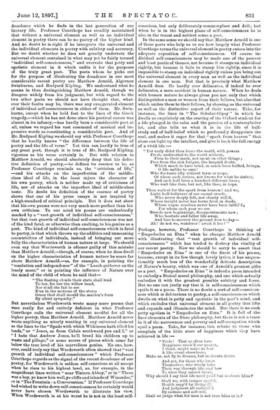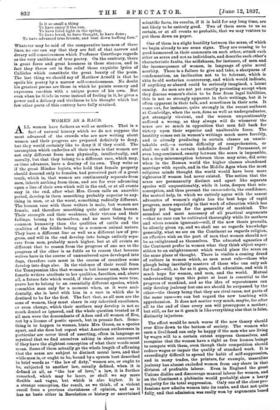SELF-CONSCIOUSNESS IN POETRY.
PROFESSOR C017RTHOPE, in his Oxford lecture on "Poetical Decadence" on Friday week, insisted very earnestly on the recent "vast growth of individual self- consciousness" as one of the main causes of the poetical
decadence which he finds in the last generation of our literary life. Professor Courthope has steadily maintained that without a universal element as well as an individual element in poetry there can be no poetry of the higher kind.
And no doubt he is right if he interprets the universal and the individual elements in poetry with subtlety and accuracy. But we doubt whether he does not greatly underrate the universal element contained in what may yet be fairly termed "individual self-consciousness," and overrate that petty and egotistic element in it which unfits it for the purposes of the truly great poet. The poets whom he picks out for the purpose of illustrating the decadence in our most considerable recent poetry are Matthew Arnold, Algernon Swinburne, and Rudyard Kipling. We understand what he means in thus distinguishing Matthew Arnold, though we disagree widely from his judgment, but with regard to the two other poets we should not have thought that, what- ever their faults may be, there was any exaggerated element of individual self-consciousness in either of them. Mr. Swin- burne, except when he held fast to the lines of the Greek tragedy,—which he has not done since his poetical career was almost in its infancy,—has hardly been a considerable poet at all, unless we regard his vast command of musical and im- pressive words as constituting a considerable poet. And of Mr. Rudyard Kipling we should say with Professor Courthope that he hardly knows "the difference between the life of poetry and the life of verse." Yet this can hardly be true of any great poet, though it is true of Mr. Rudyard Kipling, vigorous as his verse certainly is. But with relation to Matthew Arnold, we should absolutely deny that his defec- tive definition of poetry,—he defines its essence to be, as Professor Courthope reminds us, the "criticism of life," —and his attacks on the imperfection of the middle- class ideal of life, in the least injure the character of his own poetry, which is neither made up of criticisms of life, nor of attacks on the imperfect ideal of middle-class taste. No doubt his definition of the essence of poetry shows that one of his prose essays is not inspired by a high standard of critical principle. Bat it does not show that his own poems were not very much more perfect than his own criticism. To our mind his poems are undoubtedly marked by a "vast growth of individual self-consciousness," but that vast growth of individual self-consciousness was not of the kind fatal, or otherwise than exalting, to his genius as a poet. The kind of individual self-consciousness which is fatal to poetry, is that which throws up the oddities and unmeaning eccentricities of individuals, instead of bringing out more fully the characteristics of human nature at large. We should even say that Wordsworth is oftener guilty of this mistake than Matthew Arnold,—though, of course, when he does dwell on the higher characteristics of human nature he soars far above Matthew Arnold,—as, for example, in painting the "resolution and independence" of the "Leach-gatherer on the lonely moor," or in painting the influence of Nature over the mind of the child of whom he said that-
" The floating clouds their state shall lend To her, for her the willow bend,
Nor shall she fail to see E'en in the motions of the storm Grace that shall mould the maiden's form By silent sympathy."
But nevertheless Wordsworth wrote many more poems that were really flat and entirely deficient in what Professor Courthope calls the universal element needful for all the higher poetry, than Matthew Arnold. ,Matthew Arnold never wrote anything so utterly wanting in any universal element as the lines to the " Spade with which Wilkinson bath tilled his lands," or "Jones, as from Calais southward you and I," or "I hate that Andrew Jones, he'll breed his children up to waste and pillage," or some scores of pieces which come far below the true level of his marvellous genius. No one, how- ever, could truly say that Wordsworth often showed that "vast growth of individual self-consciousness" which Professor Courthope regards as the signal of the recent decadence of our poetry, for Wordsworth is seldom self-conscious at all except when he rises to his highest level, as, for example, in the magnificent lines written "near Tintern Abbey," or in" There was a boy, ye knew him well, ye cliffs and islands of Winander," or in "The Fountain : a Conversation." If Professor Courthope had wished to write down self-consciousness he certainly would never have chosen Wordsworth to illustrate his view.
When Wordsworth is at his worst he is not in the least self- conscious, but only deliberately commonplace and dull ; but when he is in the highest plane of self-consciousness he is
also in the truest and noblest sense a poet.
In the same sense we should say that Matthew Arnold is one of those poets who help us to see how largely what Professor Courthope terms the universal element in poetry enters into the adequate exposition of self-consciousness. Of course in- dividual self-consciousness may be made one of the poorest and least poetic of themes, not because it stamps an individual rightly, but because it fails to stamp him rightly, since it is impossible to stamp an individual rightly unless you bring out.
the universal element in every man as well as the individual element in one man. But that is precisely what Matthew Arnold does. He hardly ever delineates, if indeed he ever delineates, a mere accident in human nature. When he deals with human nature he always gives you not only that which distinguishes a man or woman from their fellows, but also that which unites them to their fellows, by showing us the universal
18 well as the distinctive aspect of their nature. Take, for instance, the lines in "The Scholar-Gipsy" in which he
dwells so exquisitely on the craving of the Oxford student for a life plunged in the calm and the passion of a contemplative lot, and also tells us what it is in the life of half. studyand of hall-belief which so profoundly disappoints the soul, and makes it eager for that "spark from heaven" that alone can light up the intellect, and give it back the full energy of a vivid life :—
" For early didst thou leave the world, with powers
Fresh, undiverted to the world without, Firm to their mark, not spent on other things ; Free from the sick fatigue, the languid doubt, Which much to have tried, in much been baffled, brings.
0 life unlike to ours !
Who fluctuate idly without term or scope, Of whom each strives, nor knows for what he strives, And each half lives a hundred different lives ; Who wait like thee, but not, like thee, in hope.
Thou waitest for the spark from heaven ! and we, Light half-believers of our casual creeds, Who never deeply felt, nor clearly will'd, Whose insight never has borne fruit in deeds,
Whose vague resolves never have been fulfill'd; For whom each year we see
/Breeds new beginnings, disappointments new ; Who hesitate and falter life away, And lose to-morrow the ground won to-day- Ah ! do not we, wanderer ! await it too ? "
Perhaps, however, Professor Courthope is thinking of " Empedocles on Etna" when he charges Matthew Arnold with illustrating that "vast growth of individual self- consciousness " which has tended to destroy the vitality of our recent poetry. Now we should be sorry to assert that. " Empedocles on Etna" is one of the finest of his poems, because, except in its few though lovely lyrics, it has unques- tionably much lees of the wonderfully delicate description of Nature's beauty, which was one of Arnold's greatest gifts as a poet. " Empedocles on Etna" is indeed a poem intended to embody a Stoical moral philosophy, and one which actually embodies it with the greatest possible subtlety and force. But no one can justly say that it is self-consciousness which spoils it as a poem. There is no doubt a sort of self-conscious- ness which is deleterious to poetry, a self-consciousness which dwells on what is petty and egotistic in the poet's mind, and which excludes that universal element in all poetry that lifts and expands and illuminates the mind. But there is no such petty egotism in " Empedocles on Etna." It is full of the finer elements of the Stoic philosophy, but there is not a trace in it of the narrowness and poverty and self-occupation which spoil a poem. Take, for instance, this rebuke to those who complain of the little store of happiness which they havo achieved in life :—
" Fools ! That so often here
Happiness mock'd our prayer, I think, might make us fear A like event elsewhere; Make us, not fly to dreams, but moderate desire.
And yet, for those who know Themselves, who wisely take Their way through life, and bow To what they cannot break,
Why should I say that life need yield but moderate bliss?
Shall we, with temper spoird, Health sapp'd by living ill, And judgment all embroird By sadness and self-will,
Shall we judge what for man is not true bliss or is ?
Is it so small a thing To have enjoy'd the sun, To have lived light in the spring, To have loved, to have thought, to have done; To have advanced true friends, and beat down baffling foes."
Whatever may be said of the comparative tameness of these lines, no one can say that they are full of that narrow and
dreary self-consciousness which Professor Courthope regards as the very antithesis of true poetry. On the contrary, there is great force and great keenness in these stanzas, and in fact they throw out in fine relief those exquisite lyrics of Collides which constitute the great beauty of the poem. The last thing we should say of Matthew Arnold is that he spoils his poetry by a narrow self-consciousness. No doubt his greatest poems are those in which he paints scenery and
expresses emotion with a unique power of his own. But even when he thinks in verse instead of feeling in it, he gives a power and a delicacy and vividness to his thought which but few other poets of this century have fully attained.




































 Previous page
Previous page